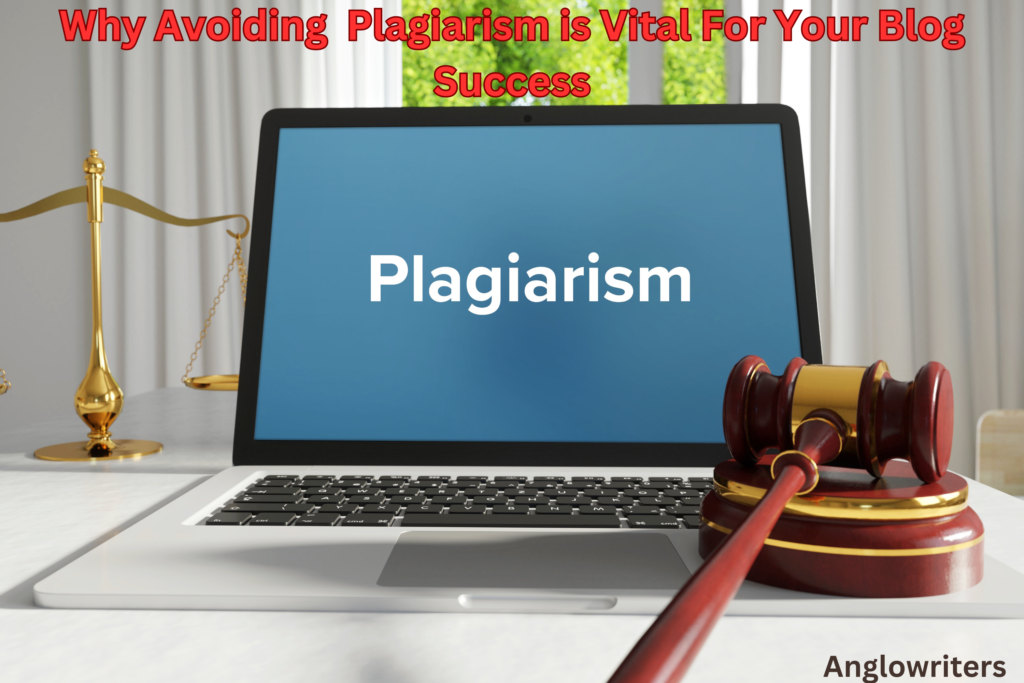Are you a blogger who struggles with creating original content and avoiding plagiarism? Whether it’s for personal or professional purposes, writing a blog post can be challenging, especially when it comes to ensuring that your work is free of plagiarism.
Plagiarism is one of the most significant concerns for bloggers, and it can have serious consequences for your website’s reputation and search engine ranking. In this article, we’ll explore why you should avoid plagiarism in your blog content and provide some tips on how to do it. Firstly, let’s define plagiarism.
What does plagiarism mean in a blog context?
It refers to using someone else’s work without giving proper credit, whether it’s copying and pasting entire articles or just a few sentences. Plagiarism damages your credibility as a blogger, and it’s illegal in some cases. Moreover, search engines like Google frown on plagiarism. They will penalize websites that are discovered to have duplicate content, meaning you could see a significant drop in your website’s ranking.
Here are five reasons why you should not have plagiarism in your blog articles:
5 Reasons why you should avoid plagiarism in your blog articles
Legal Consequences
Plagiarism is illegal and can lead to legal action against you or your website, resulting in significant financial and legal consequences. In addition, plagiarism violates copyright laws, which protect the original author’s rights to their work. Therefore, if you are caught plagiarizing, you could face legal action from the copyright owner, resulting in significant financial and legal consequences, including fines, damages, and even imprisonment in some cases.
Damage to Credibility:
Plagiarism damages your credibility as a blogger, making it difficult for readers to trust your content. Your audience expects original, well-researched, and thoughtful content from you. If they find out you’ve copied someone else’s work, they may lose faith in your ability to provide valuable information.
Read our article: A Freelance Writer’s Guide: Six Simple Steps to Become a Professional Freelance Writer
Negative Impact on SEO:
Duplicate content, including plagiarized content, can negatively impact your website’s search engine ranking and reduce its visibility in search results. Most search engines take frown at plagiarism.
Ethical Considerations:
Plagiarism is an ethical issue that violates the original author’s rights and can harm the academic or professional community. As a blogger, you have a responsibility to respect the intellectual property rights of others and uphold the integrity of the field you’re writing about.
Reputational Damage:
If you’re found to have plagiarized content, it can damage your reputation and make it challenging to build relationships and partnerships with other bloggers, influencers, or businesses. Consequently, your reputation is one of your most valuable assets as a blogger, and it’s essential to protect it by creating original and valuable content that showcases your expertise and professionalism.
How can you avoid plagiarism in your blog content?
How can you avoid plagiarism in your blog content?
Here are some tips to avoid plagiarism in your blog articles:
Use plagiarism-checking tools:
Several online tools can help you detect plagiarism in your content. Some popular options include Grammarly, Turnitin, and Copyscape. These tools can check your work against billions of web pages, databases, and academic papers and highlight any similarities or plagiarism in your content.
Give credit where it’s due:
When using other people’s work, it’s essential to give proper credit. You can do this by citing the original source and linking back to it. Also, make sure to use quotation marks when quoting someone else’s words directly.
Paraphrase and reword:
Instead of copying someone else’s content verbatim, you can paraphrase and reword it to make it your own. However, be careful not to change the meaning or tone of the original content.

Use your own words and ideas:
The best way to avoid plagiarism is to use your own ideas and write original content. While research and inspiration are crucial for writing, don’t rely solely on other people’s work. Instead, write in your own voice and style, and use original ideas whenever possible. If you need a writer, our professional anglo writers can help you create unique blog content imitating your voice and tone.
What are the plagiarism and writing aid tools to use as a blogger?
As a blogger, creating unique and original content to engage your readers and build your credibility is essential. However, with so much content available on the internet, it’s easy to inadvertently plagiarise someone else’s work. Fortunately, several plagiarism and content writing tools are available to help you avoid plagiarism and create original content.
Turnitin
One of the most popular tools for detecting plagiarism is Turnitin. Educational institutions commonly use this software to check for plagiarism in academic papers, but it’s also useful for bloggers. Turnitin compares your writing to millions of other sources and provides a report highlighting any potential matches or similarities. This tool can help you identify unintentional plagiarism and ensure that your work is original.
Copyscape
Copyscape is another popular tool for bloggers to check their content for plagiarism. It is an online plagiarism detection service that allows you to check if any other website has copied your content without permission. Copyscape scans your blog post or website content and compares it to billions of web pages in its database to identify any matches or similarities.
To use Copyscape, you simply need to enter the URL of your blog post or upload the text of your content. The tool will then search for any instances of duplicate content and provide you with a report highlighting any potential matches. Copyscape’s premium version also provides additional features, such as automatically monitoring your website for plagiarism and receiving alerts when duplicate content is found.
Copyscape can help you protect your content from plagiarism and ensure your work is original. It can also help you identify instances where your content has been copied without permission, which can be important if you want to take legal action against the infringing party.
Grammarly
Another useful tool is Grammarly. This software is designed to help writers improve their grammar and spelling but also includes a plagiarism checker. Grammarly scans your writing for any instances of plagiarism and provides a report with suggestions for how to fix it. Additionally, the software offers suggestions for improving your writing style and tone, making it a useful tool for content creation.
Read our article: Content Writing Agency: Guide to Hiring a Professional Content Writing Agency
In addition to plagiarism detection tools, several content writing tools are available to help you create engaging and original content. One such tool is the Hemingway Editor. This software analyzes your writing for readability and suggests improvements to make it clearer and more concise. The tool also highlights any instances of passive voice, adverb overuse, or complicated language, making writing in a straightforward and engaging style easier.
CoSchedule’s Headline Analyzer
Another useful tool is CoSchedule’s Headline Analyzer. This tool helps you create attention-grabbing headlines by analyzing their emotional impact, length, and structure. By creating compelling headlines, you can increase your blog’s click-through rate and engagement.
Plagiarism and content writing tools can help you create original and engaging content for your blog. With these tools, you can help avoid unintentional plagiarism, improve your writing style, and create attention-grabbing headlines. In addition, using these tools, you will be able to establish yourself as a credible and trustworthy blogger in your niche.
Read our article: Boosting your freelance writing income in 2023
Need a blog writer?
In summary, avoiding plagiarism is essential for your blog’s success. We can protect your reputation as a blogger, improve your search engine ranking, and, most importantly, help you create original and engaging content for your readers. So send us a message, and we will love to discuss your project with you and see if we’re a good fit!


